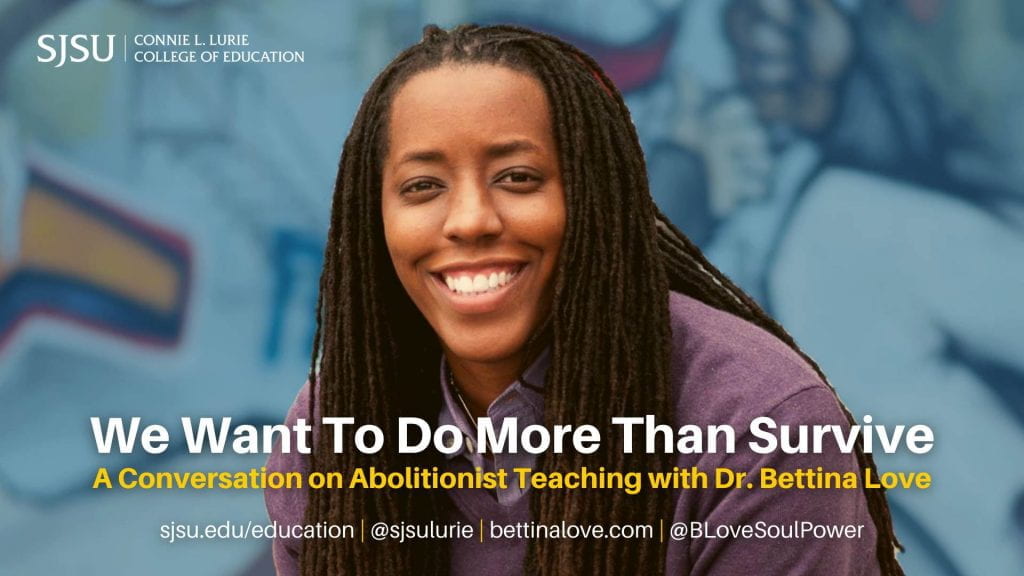
Bettina Love’s lecture attracted 800 participants on Nov. 10.
On Tuesday, November 10, San José State University’s Connie L. Lurie College of Education hosted Bettina Love, associate professor of educational theory and practice at the University of Georgia and one of the founders of the Abolitionist Teaching Network, for an hour-long lecture. The online event included a panel moderated by Saili Kulkarni, assistant professor of special education; psychology and African American Studies Lecturer Leslye Tinson, ’22 EdD; and Jacqueline Lopez Rivas, ’21 Child and Adolescent Development. More than 800 people from around the country registered for the Zoom webinar.
Lurie College Dean Heather Lattimer kicked off the event by explaining how Love’s expertise aligns with the college’s strategic plan, which affirms its commitment to prepare “transformative educators, counselors, therapists, school and community leaders through an emancipatory approach across teaching, scholarship and service.”
Bradley Porfilio, program director of SJSU’s EdD Leadership Program, originally invited Love to speak in spring 2020, but the event was postponed due to shelter in place orders related to COVID-19. On Tuesday night, Porfilio introduced Love as “a transformative scholar on abolitionist teaching and hip hop education and an inspiration to our students, who are committed to creating a society that is free from hate and free from oppression.”
Love is the author of We Want to Do More Than Survive: Abolitionist Teaching and the Pursuit of Educational Freedom and Hip Hop’s Li’l Sistas Speak: Negotiating Hip Hop Identities and Politics in the New South. Her writing, research, teaching, and activism meet at the intersection of race, education, abolition, and Black joy. She began her talk by reflecting on how the COVID-19 pandemic has shone a light on institutional racism and equity gaps in the United States and reinforced the need for abolitionist and anti-racist thought, especially in schools.
“There is a perception that racism only hurts Black, Latinx and indigenous people,” said Love. “What we don’t talk about is what society loses because of racism. Society loses when we don’t teach Black and Brown students to their highest potential. We lose doctors, lawyers, physicians, teachers, everyday people because we do not educate students to their highest potential.”
Love argued that educators need to rethink the ways their curriculum may reinforce racial stereotypes, such as minimizing the Black experience in America to slavery, police brutality or the school-to-prison pipeline. Rather, she encouraged teachers to focus on Black and Brown joy—by depicting the resilience, creativity and ingenuity of people of all races, she said, students can envision themselves succeeding in a variety of ways. She defined the difference between an “ally” and a “co-conspirator” as a reminder to non-Black and non-Brown people to do more than pay lip service to an abolitionist and anti-racist future by taking action to make change. When her talk concluded, she answered questions from the panelists that had been partially sourced from the 800+ registered participants.
“I truly believe that we have to fight racism and injustice, but we also have to believe that Black and Brown children are worthy—full stop,” said Love as the evening was drawing to a close. “Because if you believe that Black and Brown children are worthy, then you won’t fight racism from a deficit mindset. Do you think these people are worthy of their biggest dreams? To fight for them, you must believe that their life has so much value that it makes your life better.”
